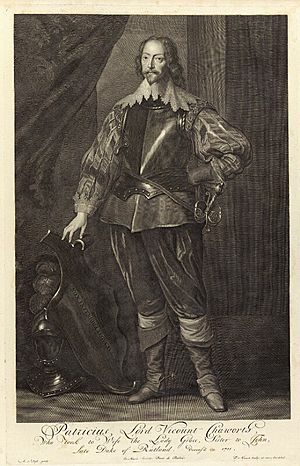John Chaworth, 2nd Viscount Chaworth facts for kids
John Chaworth (born 1605, died June 1644) was an important English nobleman. He held the title of 2nd Viscount Chaworth of Armagh. He lived during a very turbulent time in English history, known as the English Civil War.
Early Life and Family
John Chaworth was the son of George Chaworth, 1st Viscount Chaworth and Mary Knyveton. He grew up in a noble family.
He married twice during his life. His first wife was Elizabeth Noel. They had three children together:
- Mary Chaworth
- Elizabeth Chaworth, who later married William Byron, 3rd Baron Byron
- Patrick Chaworth, 3rd Viscount Chaworth, who would inherit his father's titles
After Elizabeth's death, John Chaworth married Anne Hickman in December 1643. Sadly, he passed away just a few months later in June 1644.
Noble Titles
John Chaworth became the 2nd Viscount Chaworth of Armagh and 2nd Baron Chaworth of Tryme on July 3, 1639. These titles were passed down through his family. A "Viscount" is a noble rank, usually below an Earl but above a Baron.
Role in the English Civil War
During the English Civil War, John Chaworth was a strong supporter of Charles I of England, the King. This war was fought between those loyal to the King (called Cavaliers) and those loyal to Parliament (called Roundheads).
In December 1642, Lord Chaworth made his home, Wiverton Hall, a special base for the King's army. This meant the hall was used as a "garrison," a place where soldiers could stay and prepare for battle.
Wiverton Hall became an important stop for royal visitors. In June 1643, Queen Henrietta, the King's wife, stayed there. She wrote to the King about her travel plans from Wiverton.
Other important guests included Prince Rupert of the Rhine and his brother Prince Maurice. They were leading generals for the King. After visiting King Charles in Newark, they rode to Wiverton Hall with about 400 soldiers. They stayed there to plan their next moves. From Wiverton, Prince Rupert even sent a letter to Parliament, asking for permission for himself and other noblemen to leave England.
 | Valerie Thomas |
 | Frederick McKinley Jones |
 | George Edward Alcorn Jr. |
 | Thomas Mensah |


